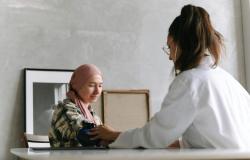
Professor Ismael Palacios is an engineer in Molecular Biotechnology and Doctor in Neuroscience. At present, he also serves as a researcher at the Center for Studies in human Neuroscience and Neuropsychology of the Faculty of UDP Psychology.
Recently, the researcher published Tu microbiota importsbook in which it addresses the relevance of these microorganisms in our lives. As he says, through this work he seeks to bring this issue closer to the community and contribute to his understanding. “The microbiota was something we did not know and that we are incorporating today, since it can help us live better and make better decisions,” he says.
What led him to write the book Tu microbiota matters?
Basically, because I recognized a gap between science and the community, where scientists were in a super separate place, studying interesting things that can be relevant to the general public for their implications. Then, from there my intention arose to make scientific dissemination and the book is a final manifestation of all the scientific dissemination work that I have done.
What is the microbiota and how does it influence our body?
The microbiota is this group of microorganisms, mainly bacteria, but also fungi, protozoa, viruses that inhabit our body, in the digestive tract, in the colon, but also in the skin, in the mouth, the sexual mucous membranes, and fulfill relevant health functions. How do they do this? Through the regulation of body systems. What systems? They regulate the immune system strongly. Then, they impact health, but they are also producing sources of important molecules for our body.
To what extent can the imbalance of the microbiota influence people’s mental health?
Mental health can be strongly affected by the microbiota. We have some studies that show their involvement in depression, anxiety and neurodevelopmental disorders by multiple pathways: for the vagus nerve, regulation of the immune system, endocrine pathways and also by the release of certain molecules. We know that neurotransmitter metabolism such as dopamine, serotonin and GABA are closely regulated in the intestine, so their levels depend largely on microbial activity. In this way, what is known as the intestine-cerebro axis, an increasingly recognized link for its impact on mental health is configured.
How can beating in urban contexts impact on the microbiota?
-The microbiota must be understood in this way: it is in all places. It is initially in nature and also colonizes our urban environments, which we call the microbiome of the built space. So, this is super relevant, because one can begin to design urban environments, incorporating the idea of microbiome. Where does it become relevant, particularly? In hospitals, for example, where crop broths, ventilation systems are generated. The spaces that we colonize affect us and vice versa, according to the bacteria that are. It has been seen that, in more urban environments, versus more wild, natural and farm environments, the diversity of bacteria changes and is different. That can affect human health.
The study of the microbiota is recent. In that sense, what challenges do you glimpse for your research?
This is very new. We have about 15 years of research. Many methods are being developed, there are world initiatives, science already believes a lot in this and I see that the great challenge is that this permeates the clinic and the company so that we can replicate it in the clinical practice of professionals. I think that is the biggest challenge, because, for the moment, we only stay or we are only accumulating data, scientific information. We have to talk, the most basic science with the clinic, and start generating data that incorporates these axes.
You have developed in the fields of biotechnology and neuroscience. In your investigative work, how do both disciplines come together?
I have always been in multiple spaces and I consider that I am a knowledge integrator. I strongly defend interdiscipline and I think that everything I do goes from that place, from understanding macro aspects of the human being, but also to understand more micro mechanisms and aspects; Understand people’s health, incorporating not only elements such as the brain, but the body, the microbiota, things that you would never have thought before. So, my background, So varied, from the most basic, biotechnological science, of more basic, but applied processes, to also understand mental health, cognitive and theories, help me to have this integral vision that allow us to understand and think how we are going to walk in a more complete way.
What other area would interest you to continue investigating? How do you project your research work?
I am interested in understanding human health and well -being from the integration of systems. The microbiota interests me a lot and, something different and novel that I would like to investigate, it is how environments affect the development of people. Something very concrete: I would love to study how the health of children who have contact with nature is positively stimulated. So, think of urban orchard programs, where there is contact with nature, with the earth, see how these children can positively stimulate their microbiota, how they can learn about food and how that can promote better food and positively stimulate their human physiology.
How can publication help Tu microbiota imports to people?
This is a scientific dissemination book that is easy to read, entertaining and close. I think that what can help the most is that people become aware that this exists, that it is relevant and that they can make decisions, thinking of the microbiota. This is transverse. It has to do with the design of hospitals, but in something closer, it has to do with how I think my house, my habits, the decisions I make when planning a pregnancy, the type of pregnancy, how I think breastfeeding. So, this book can approach the subject super easy so that people know what are the different aspects of life that are affected by the microbiota and what things can modify about it.





